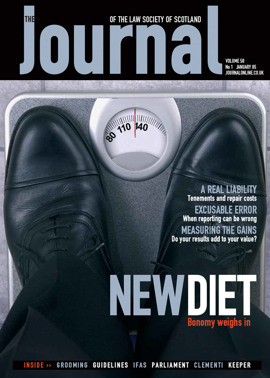No room for half measures

“If you’re going to undertake solemn work, you have to be up to speed because this is the biggest change in solemn procedure in my memory.”
Gerry Brown, Convener of the Society’s Criminal Law Committee and a practitioner whose career spans the last two criminal procedure consolidations, has no doubt of the significance of the Bonomy reforms: “Gone are the days when you appear on behalf of someone who is charged with a serious offence which is likely to proceed in the High Court, you write for a provisional list of witnesses and if you hear nothing further you do nothing else until service of the indictment.”
Solicitors will have to be especially careful to mind their procedural ps and qs. Part 1 of the new Act, dealing mainly with preliminary diets, applies only in High Court cases – but Part 4 separately replicates some of the provisions for the sheriff court. Part 2, containing important provisions on time limits, citation, representation, desertion of diet, obstructive witnesses and preliminary pleas, among other matters, applies to solemn proceedings generally. Already in force is the obligation on defence solicitors to notify the Crown that they are acting in a case; most other provisions come in on 1 February 2005. For solemn cases in the sheriff court, the new disclosure regime for Crown evidence will be piloted in Alloa, Stirling and Falkirk from 1 April, and rolled out across the country over the following year.
Plenty to prepare
The new preliminary hearings will take place as from 1 April 2005. “The preliminary hearings will confirm first of all whether a solicitor has been engaged, dispose of any preliminary pleas, and then require the accused to state how he pleads, deal with preliminary issues, vulnerable witnesses, sexual conduct notices, and any other matters which the court would be able to dispose of in advance of the trial”, Gerry Brown explains. “And very importantly, ascertain whether there is any objection to the admissibility of evidence, and which witnesses are available for the trial. The legislation wants to do the following things: to front load the cases, to make sure the trial goes ahead at the time and place set, to cut down evidence to that which is strictly necessary, to inconvenience as few witnesses as possible and to give agreed pleas greater prominence.”
A detailed High Court practice note, currently in draft, fleshes out what the court expects of each side in preparing for the hearing: full information about their state of preparation; timeous lodging of statutory notices; full consideration of what evidence would require to be led at any trial, and checks on availability of witnesses; consideration of what preliminary pleas or issues might be disposed of; and agreement of as much evidence as possible.
A matter of interpretation
Lord Bonomy intended that judges should proactively seek to progress cases. But how that works in practice, according to Brown, will depend on how they deal with the issues arising, particularly questions of admissibility. “If it means that this deals with what is known as the knockout blow to proceedings, that I think is a reasonable way to address that issue because if there is something fundamentally wrong with the proceedings or the admissibility of certain evidence, raising it as a knockout blow at that stage is sensible.
“The question is whether it will be interpreted as meaning more than that. If it means that all objections to evidence that are foreseeable, or presumably reasonably foreseeable, have to be raised at the preliminary diet, there are a number of implications. Does it mean the accused has to reveal his hand and disclose in detail his position, which could lead to self-incrimination? Does that sit well in the context of an article 6 argument in relation to the adversarial system? If the new system is to work, this is one of the major issues that has to be clarified. The question of interpretation of [the new section 72B(4)] is very important because what might be perceived by a solicitor as something that should be raised at this stage might not be perceived as such by counsel. What is reasonably foreseeable is a question of interpretation and somewhat difficult.”
Brown is hopeful that the matter may yet be clarified in the final version of the practice note, the Society having raised the issue in response to the draft.
The disclosure principle
One consequence of the “front loading” approach is the necessity of the Crown making full disclosure at an early stage. The Crown in a practice statement has committed itself to producing all relevant material within agreed timescales, enhancing the principles in McLeod v HM Advocate 1998 SCCR 77. While at present the Crown exercises a discretion as to what to disclose, in future it will only withhold statements, exceptionally, where it does not intend to call a witness and it would not be in the public interest, for example due to risk to life or serious risk to other investigations.
By the stage of the preliminary hearing the Crown and defence should have prepared and lodged a written “record of state of preparation” – referred to in the draft practice statement as a joint record, though the Society’s view is that it should be individual to each party, “because you’re dealing with individual responsibility”, Gerry Brown points out. “It would be like a joint civil record where each and every side, that’s all the co-accused, is putting in writing for the preliminary hearing the state of preparation having dealt with all the issues. That is after having what they call a managed meeting – a meeting between the Crown and defence to try and see if they can resolve issues in advance of the preliminary hearing.” By the draft practice note the accused’s solicitor must have obtained all necessary instructions to enable preparation of the record.
A major aim of the Bonomy proposals was to secure a higher level of witness attendance. It is hoped that the need to cite witnesses can be reduced through enhanced disclosure of evidence on the one hand, and disclosure of pleas on the other. However where a case is set down for trial each side will have to satisfy the court at the preliminary hearing that their witnesses will be available for trial, because at that hearing the trial diet will be fixed in the expectation that trial will indeed go ahead then.
Of course, life being life, the unexpected will occur, and no formal citations can be sent until the trial date is set at the hearing, but should problems emerge later, the practice note requires that the court and other parties be advised as soon as practicable.
Trial in absence?
Only on one matter did the Society have a serious issue with the Criminal Justice Bill as presented to the Scottish Parliament. The proposal that a trial might proceed in the absence of an accused who failed to appear raised deep principled objections to acting without being able to take instructions. A watered-down version of the clause remains in the Act, so can the Society be happy?
“There still is the potential for trial in the absence of the accused,” Gerry Brown concedes, “but the Act and the authority of the case of R v Jones ([2003] 1 AC 1) now mean that these are unlikely to proceed unless sufficient Crown evidence has been led, so therefore in reality trial in absence is not something that is likely to happen as it was first anticipated. The provision has been diluted to a large extent because of evidence to the Justice Committee during the passage of the bill.”
Finding the funding
The Society’s remaining concerns relate to resources. It was suggested during discussions on the Bonomy proposals that as much as 20% of High Court business could move to the sheriff court (sheriffs’ sentencing powers were increased to five years in anticipation of this). While it appears that the Crown have not begun to move cases in large numbers, says Brown, “It’s important that in the sheriff court they have sufficient facilities and resources to deal with that business.”
What will have to be urgently addressed is the legal aid scheme, not designed to cope with Bonomy-type procedures. “There are ongoing discussions just now with the Legal Aid Board and the Executive”, Gerry Brown emphasises. “There will have to be transitional provisions for a fee structure for solemn work both for solicitors in the High Court and in the sheriff court, and a structure for fees for solicitor advocates. That’s ongoing just now, but it has to happen quickly.
“One thing Bonomy did say was that if you’re going to frontload the system, going to make it efficient, you have to remunerate properly the practitioners involved in the system. At the end of the day if the system becomes more efficient, the savings will be in witness time, court time. So if for example there was an increase in legal aid fees in solemn work, this is likely to be balanced by savings in witness and jury expenses and court time.”
Brown’s parting shot underlines his message to be ready. “What the profession needs to do is read the legislation, to attend any training courses arranged and to get to grips with the new procedures as soon as possible. I would go as far as to say that if a solicitor who is undertaking solemn business is only tinkering with it, they have to be extremely careful. The sea change is such that to undertake such work is not for the well-meaning amateur.”
In this issue
- Riding the wave of change
- Last stand for the defence
- Losing the wait
- What right to be wrong?
- Prevention as the cure
- No room for half measures
- Poles apart
- Get IT right
- The value proposition
- A time for resolution
- When it falls, it falls
- Round the houses
- Private bills and public interest
- Charging Peter to pay Paul
- Fair pay for liquidators
- Website reviews
- Book reviews
- Fair notice?
- The new title conditions






